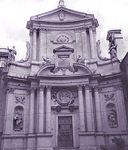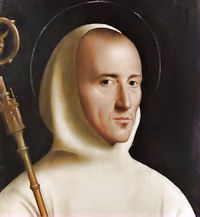Lent: April 1st
Wednesday of the Fifth Week of Lent
Other Commemorations: St. Hugh of Grenoble, Bishop (RM)
» Enjoy our Liturgical Seasons series of e-books!
"Everyone who exalts himself will be humbled, and the one who humbles himself will be exalted." (Lk. 18:14) "Even if we should have mounted to the very pinnacle of virtue, let us consider ourselves last of all; having learned that pride is able to cast down even from the heavens themselves him who takes not heed, and humbleness of mind to bear up on high from the very abyss of sins him who knows how to be sober. For this it was that placed the publican before the Pharisee." — St. John Chrysostom
Meditation- Lord, You Are All We Need!
For all of us life has its trials when the 'sea' on which we are sailing becomes stormy and waves threaten to submerge us and we, in the boat with the sleeping Jesus, cry out, as the apostles did, to wake Him "Master, do you not care. We are lost?” (Lk. 8, 24 and Mk 4, 38). Hearing the cry Jesus stands up and at his commands the wind and the sea are calmed. But he rebukes the apostles for their lack of faith: “Why are you so afraid? Have you still no faith?” (Mk 4, 40).
Jesus teaches us that no one and nothing, should weaken our trust in Him, if we intend to be his disciples. And trials or tests, in pedagogy and with God, are of inestimable value because they fortify the Christian's most precious gift, faith.
Trials are an opportunity for us to demonstrate our trust in God, to show that our act of faith professed in words is an act of the heart and the will, an act of total acceptance of the providence God who does not spare us trials but turns them into grace.
To experience that we are capable of persevering if we are with Jesus, is one of the most beautiful experiences of Christian life and it prompts us to praise God who always frees us, even though sometimes the ways and means he uses are beyond our imagination: “How can I repay the Lord for all his goodness to me? I will lift up the cup of salvation and call on the name of the Lord. I will fulfil my vows to the Lord in the presence of all his people. Precious in the sight of the Lord is the death of his saints. O Lord, truly I am your servant; I am your servant, the son of your maidservant; you have freed me from my chains. I will sacrifice a thank offering to you and call on the name of the Lord.” (Sal 116, 12-17).
God always gives us more than we ever hope for. To work his miracles he starts by enlarging our heart, preparing it for the immensity of Heaven, our final destination.
In times of trail God's presence is often silent and may seem absent, whereas in actual fact it in veiled behind the ineffable mystery of His almighty Love, which desires the good of those who love Him (Rom 8, 28). Only pride and arrogance can prevent God's love from working in us. Whereas humility in a believer who has complete trust in the love of the heavenly Father, makes miracles possible.
Happy the Christian who says in times of trial: Lord, I will not wake you even if everything around seems to be collapsing, because I am certain of your Presence. I am not worried about the waves and the wind, because you are with me, as you promised: “Lo, I am with you always, until the end of time” (Mt 28, 20). Yes, Lord, you are all we need!
The Blessed Virgin Mary lived with faith and complete and unconditioned trust in God, following her Son, Jesus of Nazareth, to Calvary, to Jerusalem, becoming similar to Him. In the heart of the Sorrowful Mother there was no doubt, at the foot of the Cross, amidst the tempest of history when all hell was unleashed against the Redeemer of the world to overcome Him and with Him all humanity. She did not 'cry out', she simply trusted in Jesus' promise that on the third day He would rise again (cfr. Lc 9, 22). Unlike the other women disciples, Mary did not run to the tomb, she knew it was empty.
May the Mother of our faith help us never to doubt the power of the Redemption, “the power of merciful Love”. The Church teaches us to entrust ourselves to Mary, always and especially at crucial times in life:
“To you O Mother I entrust the world and all its peoples, to you, to your maternal heart, I entrust the consecration of the world.O Immaculate Heart! Help us to conquer evil rooted deeply in the hearts of men today which has immeasurable effects on the present day and threatens to close the path to the future!
Save us from famine and from war!Save us from nuclear war, from all war, incalculable self-destruction!
Save us from sins against human life from its beginnings!Save us from hatred and scorn for the dignity of the children of God!
Save us from all injustice, social, national and international!
Save us from trampling God's commandments!
Save us from attempts to obscure the truth of God in human hearts!
Save us from losing awareness of good and evil!
Save us from committing sins against the Holy Spirit!
Hear O Mother of Christ, the anguished cry of suffering arising from all peoples! Charged with the suffering of whole societies!
Help us to overcome, with the power of the Holy Spirit, all kinds of sin: sins of men, sins of the world, all sin.
May the infinite salvific power of the Redemption, the power of merciful Love, show itself once again! May evil stop! May hearts be converted! May your Immaculate Heart offer everyone the light of Hope!” (John Paul II, Act of Consecration, 25 March 1984). (Agenzia Fides 5/2/2009; righe 63, parole 955)
— Ave Maria by Mgr. Luciano Alimandi
Things to Do:

The Station today is at the church of St. Marcellus at the Corso. Legend claims that Pope St. Marcellus (308-309) was sentenced by Emperor Maxentius to look after the horses at the station of the Imperial mail on the Via Lata, where the Via del Corso now lies. He was freed by the people, and hidden in the house of the Roman lady Lucina (see also San Lorenzo in Lucina). He was rearrested, and imprisoned in the stables.
St. Hugh of Grenoble (or Châteauneuf)
In the eleventh century the diocese of Grenoble in southeastern France was notorious for corruption. Simony (the buying and selling of spiritual goods), usury, immorality, and ignorance were rampant in that area. During a Church synod at Avignon in 1080, it was decided that a strict bishop should be appointed to correct these abuses; one who could lead both clergy and laity to conform to the laws of the Church. Saint Hugh was unanimously elected to the office.
Hugh was born near Valence in southern France in 1053. After completing his formal education, he accepted a canonry (an official membership in the bishop's council) in the cathedral of that city. In his early twenties, he met the bishop of Die, who was impressed by Hugh's virtue and administrative talents and offered him a position in his own diocese. Hugh accepted the offer and later went with the bishop to the synod at Avignon, where he was unexpectedly elected to the see of Grenoble. After being ordained at the age of twenty-seven, he was consecrated bishop by the pope.
For two years, Hugh preached, fasted, and prayed in an effort to correct the many abuses in his diocese. Then, feeling that a new bishop might be more successful, he resigned and entered the novitiate at the Benedictine abbey of Chaise-Dieu. He was there only a short time when Pope Gregory VII commanded him to return to his see. Once again in Grenoble, Hugh more effectively fought the evils in his diocese. The poor were his greatest concern; once, during a time of famine, he sold his ornate gold chalice to buy them food. In 1084, when Saint Bruno, founder of the Carthusian Order, was looking for a site for a new monastery, Hugh, guided by a dream, granted him the territory known as "the Chartreuse" which gave the order its name. Hugh is often portrayed in art in connection with the Carthusians; he admired the monks and frequently visited them, happily joining in their exercises and performing the most menial tasks.
Throughout his fifty-two years as bishop of Grenoble, Hugh harbored a desire for contemplative life, but because of the tremendous influence of his holiness, pope after pope refused to release him from office. He died after a long illness and was canonized two years later by Pope Innocent II.
—The Lives of the Saints for every day of the year, Vol. 1: January-April
Patronage: against headaches; Grenoble, France
Symbols and Representation: carrying a lantern; one of a group of seven stars, representing the founders of the Carthusians; with Saint Bruno; with three flowers in his hand
Highlights and Things to Do:
- Read more about St. Hugh:
- In 1084 St. Hugh gave to St. Bruno and his six companions the land of La Grande, a desert in his diocese, called the Chartreuse, where they could live in solitude. It was here that St. Bruno founded the Carthusians. The entire name of the Carthusians is "Order of the Chartreuse." The liqueur Chartreuse originates from the Carthusians. Find out the history.
- Find out more about Carthusian monks and see the list of monasteries in the world.






